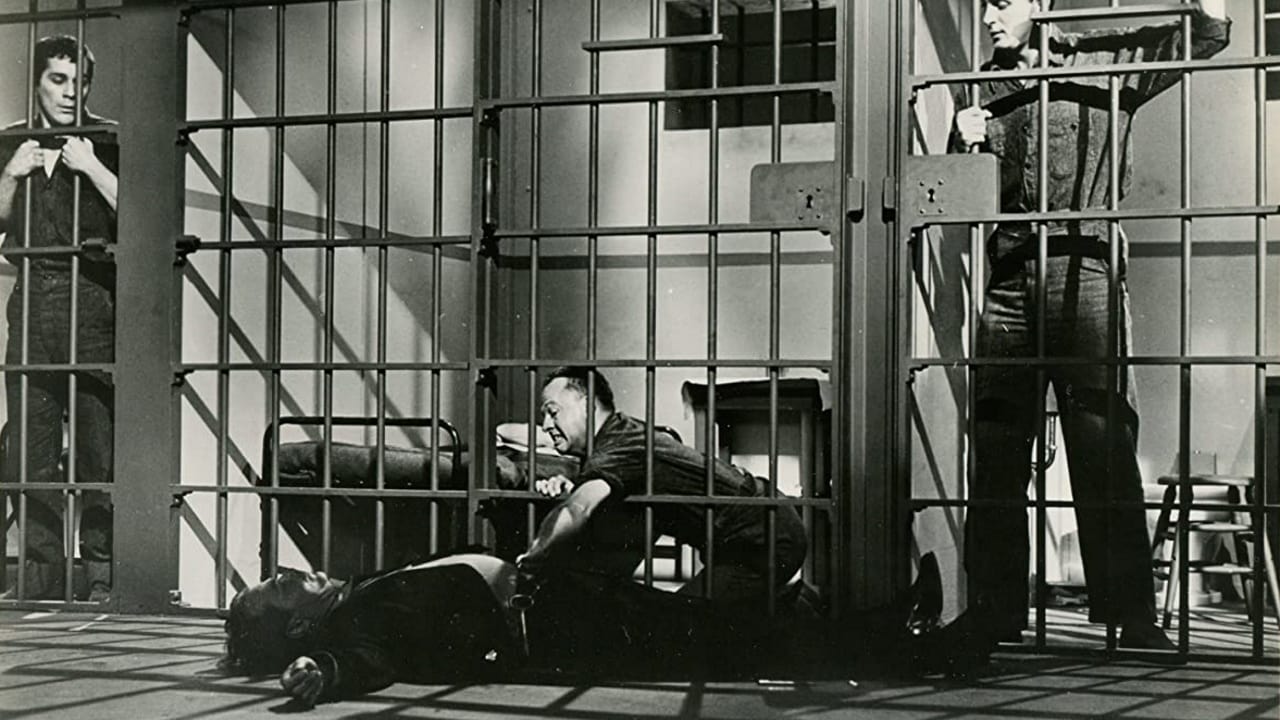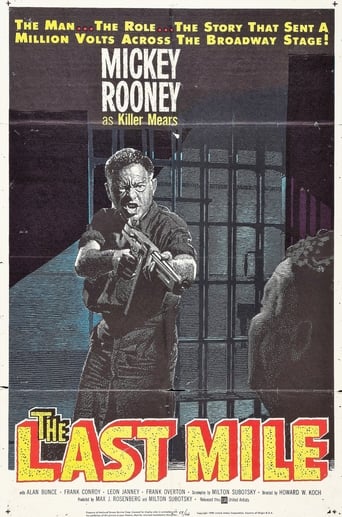

This remake of The Last Mile has been updated nicely with a nice jazz score and the inmates and prison officials definitely fit the Fifties as opposed to the Twenties when it first appeared on Broadway. But the impact of this searing prison drama hasn't changed and Mickey Rooney stretches his considerable talent to the limit playing the lead of Killer Mears who leads the uprising of the death row inmates.Mickey has some fast company among the people who've done this part. Spencer Tracy did it on Broadway and his performance there led to his original film contract with Fox. Clark Gable after doing some bit parts and extra work in silent films was spotted doing this in a touring company in Los Angeles which led to his MGM contract. And Preston Foster did it in the original screen version. Rooney's performance stands up to any of their's.It's a simple plot, but the characters run deep. Before the big attempted breakout we get a character study of each of the inmates on Death Row. It takes a good actor to get himself noticed here though because the character of Killer Mears so dominates the film and the other inmates. These are men with nothing at all to lose, a lot like the inmates shown in The Green Mile. But of course they don't have a character like Mears to whip them in a frenzy when a guard slips and Mears gets the upper hand.Being that the film is only on one set for 95% of the time, it's a small budget affair, hardly like Ben-Hur which came out the same year. Still Rooney's incredible performance should have merited Oscar consideration. He was nominated for films and performances not half as good as this.Try to see both the Preston Foster and Mickey Rooney versions together. Too bad we can't see Spencer Tracy or Clark Gable in how they did the role. The Last Mile is timeless as long as we have capital punishment. I can see Russell Crowe doing Killer Mears easily in a 21st Century version.
... View MoreGritty, realistic movie of those on the wrong side of the bars and of life. A simply great movie that stays in my mind though I haven't seen it since I was a teenager (I'm 61 now).Though, as I said, it is a great movie; it would simply be another unmemorable, tepid little jail-house potboiler if not for a towering performance by Mickey Rooney. No pun intended. Every once in a while I check to see if it has come out on DVD. Not yet. Too bad. It would sell to those of my age group; which I guess explains why it is not out.I used to work in the industry, as a "grip" back in the early 70's. The workers spoke very fondly (and in certain areas, with awe) of Mickey. Dennis/Kim
... View MoreWhile the original 1932 version, with Preston Foster, was good, there's no remake more worthy than this 1959 one, or more impossible to find anywhere, just as I strongly suspect Mickey Rooney to have had something to do with that. Never could a mere performance have ever been so masterfully brilliant, or a script more thought-provoking, as well as an improvement upon the original. Many years after the last of my several viewings of this film, in 1970, I read an article in which Mickey Rooney was recounting a visit he'd made to death row, and which had apparently very drastically eliminated whatever sense of personal identification he'd felt with people in similar circumstances. The article was about as short as the main character here, and didn't cover much, other than the extent to which his extreme disillusionment with the quality of the inmates themselves had been emphasized, even in language I would not care to explicitly quote here. . . . . One of my main problems with capital punishment is that, of course, it is not evenly, impartially applied, just as many innocent people are far-too-carelessly, thus unnecessarily sent to meet this particular fate. Another problem I have with it is that it is not applied swiftly enough, or, for that matter, even publicly enough! The bible makes a special point, in such cases, about one of the more important purposes of such, as a deterrent, being ineffectually obscured, minus, not only a public viewing, but also the direct participation of all! As for those who claim to prove, statistically, that such is not an effective deterrent? In addition to having a problem about the reliability of their data, I have little if any objectively disprovable doubt many are behind bars now due to the extent that such a deterrent is lacking. However, I do have a problem about the fact that Robert Duvall, in The Apostle, had been punished at all, for his particular "crime," or that the only hope of leniency for one such as he would have to be based on a "temporary insanity" defense, as though that would serve as the only acceptable excuse in his kind of case. . . . In addition to various other questions concerning the motives of Mickey Rooney for that particular visit he'd recounted, and about the answers to which I can only try to speculate, I suspect the main one had been of a decidedly religious nature. I don't know exactly when he'd become the professing Christian he now makes it a special point, whenever possible, to emphasize that he is; but, as anybody should be well-aware, this particular category of people tends to be the most vehemently out for blood, when it comes to extracting an eye for an eye. However, I have no particular bone of contention concerning that, per se, just as there's no doubt, scripturally speaking, that not all, and perhaps not even most, shall be spared the same ultimate fate, at the hands of the Lord Himself, as a result of His sacrifice on the cross. However, there is a problem, for me, about the spirit or attitude with which most professing Christians emphasize their enthusiasm for capital punishment; for, contrary to the Lord Himself, who would love to see everybody saved (Ezekiel 18:32) (II Peter 3:9), they seem to go vindictively out of their way to find reasons to condemn! . . . What most people, on either side of this superlatively ever-burning issue, cannot appear to sufficiently appreciate, is that the Lord is as dynamically and elusively soft in nature as He is hard. The two sides of His nature appear to be so inherently incompatible as to render Him mentally deranged, at least by any strictly human reckoning. Yet, regardless of how harrowingly ungraspable this miraculously dynamic blending of the water and oil in His nature surely is, there can be no doubt that anything short of it, or anything fanatically and characteristically on either one side or the other of this equation, falls inadequately and unacceptably short of the entire judicial truth. Indeed, I've seen the most blood-curdling thirst for the same come out, self-contradictorily enough, on far-too-many occasions, whenever the categorically anti-death penalty advocates are confronted, even in the most rationally well-balanced ways, with the fact that, although the Lord died for everybody, not all are thereby going to be saved. After-all, in order to receive absolution, one must, to repeat the same term, reach out and receive it, that is, repent (Luke 13:3-5). Could anything make more sense? . . . But, then, what about the Lord's command to forgive, even in the case of one's enemies, of those who despise and persecute you without a just cause or provocation? One of the far-too-prevailing difficulties with this kind of sentimentality, as popularly misinterpreted, is the way it obscuringly over-simplifies the real meaning of forgiveness. The act of forgiveness does not, in itself, mean the same thing as unconditionally excusing the one being forgiven. When one takes a clearly sober, rationally well-balanced view here, from the perspective of God's own attitude, all it actually amounts to is a fervent wish that the one forgiven will ultimately succeed at finding his way, seeing the light, and being granted mercy. This attitude is, of course, the very opposite of, say, that of Jonah, who actually resented it when God told him that his preaching to the people of Nineveh would result in their repentance. Jonah didn't want them to repent, but vindictively desired that they be destroyed. How self-righteously, cold-bloodedly like unto most professing Christians he was, save that even his reasons were undoubtedly better than most! I envy Jonah almost as much as he would me! However, minus the repentance of the one being forgiven, any forgiveness he may receive from a genuine Christian is not going to do him any good. In such a case, the only one to benefit is the real Christian himself!
... View MoreHaving not seen this film in about 20 years I am still impressed with it 's hard -hitting impact and stellar acting. Of course, one Mr. Mickey Rooney is indeed, INCREDIBLE in his role as the ring-leading "Killer".(In reference to another review here-none other than Orson Welles evoked Mickey Rooney's name as the greatest movie actor,also.) I also recall the jazzy-brassy score and the bare black and white photography. I love the Mick's last line before he goes out for his dose of lead poisoning.(I think the Stranglers lifted it for a line in one of their songs-Get a Grip on Yourself.)This is a great film and unjustly buried film. Let's get it out ! Side note-a recent Film Review magazine gave a big write up on Don Segal's "Babyface Nelson" ,made a couple years before "Last Mile" and also starring Mickey Rooney. Another rave of the Mick's intense and sympathetic performance.Perhaps it's the start of a groundswell of a appreciation for some truly superior cinematic performances.
... View More